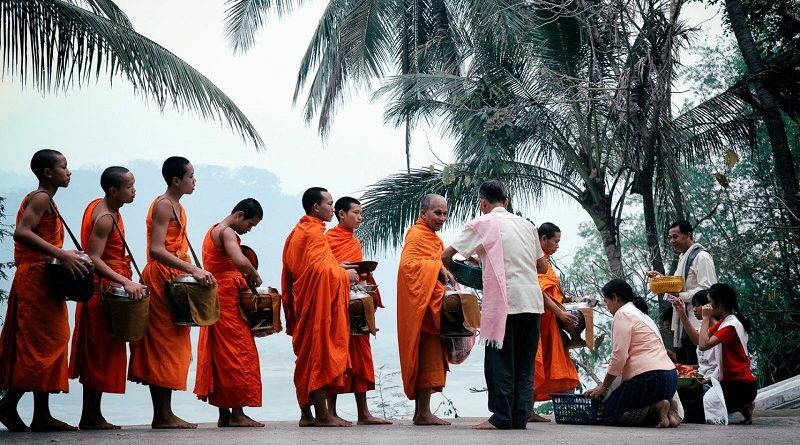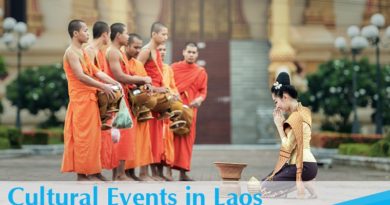Buddhist Lent, A Time For Sobriety
Source: Vientiane Times
Last Saturday marked the start of Buddhist Lent, when a festival known in Lao as Boun Khao Phansa sees people go to temples to make merit by giving offerings to monks.
Lao people nationwide enjoy the preparations for Lent and eagerly look forward to this auspicious time.
Following age-old traditions, people throughout the country will prepare the items traditionally donated to monks. These include rice snacks and other simple foods, as well as new robes, candles, incense sticks, flowers and basic essentials needed in daily life.
The word “boun” means merit, so on Saturday the festival is a celebration of the start of Lent when people do acts of merit.
As well as offering alms to monks in the morning, people may make donations at any time later in the day.
The most colourful aspect of the day are the candlelight processions that take place in the evening when people again go to temples to worship Buddha and pray.
They form groups and follow monks in a solemn procession around the temple, walking around it three times as they reverently hold flowers, lighted candles and incense sticks, while praying and making wishes.
Some temples organise special prayer and mediation sessions before the candlelight procession.
Buddhist Lent lasts for three months and is also known as the “rains retreat”.
It is a time when monks remain in one place during the rainy season. The day after the Khao Phansa festival, monks recite their vows after evening prayers.
Buddhist Lent runs for three lunar months during the rainy season.
Khao Phansa, the first day of Lent, falls on the first day after the full moon of the eighth lunar month and this year falls on Sunday, July 25.
The Buddhist Lent Festival Boun Khao Phansa is held on the full-moon day immediately preceding Lent, which this year is Saturday, July 24.
Buddhist Lent is a special and auspicious time for which both monks and laypeople prepare themselves and devoutly observe.
Monks in temples throughout the country spend a whole week preparing for the Lenten festival. They clean up around the temple and their living quarters and prepare to receive the large number of devotees who will come to give offerings.
They are required to prepare themselves both physically and spiritually and focus on Buddhist principles during the three months of Lent.
Monks who don’t have a permanent place of residence must find a place to stay before the start of Lent, as they will not be able to travel far during the following three months.
Men and boys who want to become a novice or monk and spend time studying the principles of Dhamma must attend an ordination ceremony before the start of Lent and find a permanent residence for at least three months. During Lent, monks and novices cannot move from one temple to another unless it is essential.
Many temples also organise short-term ordination sessions for boys who want to spend time in a temple during the school holidays. Many new novices find the lifestyle appealing and don’t want to leave, so they may remain in a temple for the whole of Lent or even longer.
Lent is also a time when some people change their behaviour and act with more restraint, hoping to earn more merit.
People who like to drink may stop or cut down on their drinking over Lent. They do this because it improves their health, brings calm to their lives and also saves money. Some smokers may also modify their habits for the same reasons.
This year, many people, especially habitual drinkers, are looking forward to Lent. Some will encourage their friends to make a pact to abstain throughout Lent, so that they support each other and it’s easier to maintain abstinence.
Some families also agree to give up drinking, as they recognise that staying off the booze makes them more peaceful and happier.
Giving up alcohol and undesirable forms of behaviour during Lent is not a mainstream practice but seems to be gaining in popularity each year.
Even though it’s quite hard for someone who is weak-willed to exercise sufficient self-control to give up drinking or some other lifestyle habit, it is considered to be meaningful to achieve this for the whole of Lent.
It indicates that the person has had sufficient willpower to achieve their aim, so those who are successful will be happy and proud, as will their family.
Monk Khamchone at Vat Haisoke temple in Chanthabouly district, Vientiane, said “During Lent, monks and novices are required to be more dedicated in observing their routines and principles throughout the three-month period. They must wake early in the morning for prayers at 4am, meditate for longer, and learn more about and try to uphold the actions and teachings of Buddha (Dhamma).”
“It is a most important and meaningful time for monks, novices, nuns, and those who want to learn more about the teaching of Buddha and uphold Buddhist practices more strictly.”
“The main reason for the three-month fixed residence period is for monks to learn more about Buddha’s teachings, purify their minds, and meditate. And during the rainy season it’s not good for monks to wander from place to place.”
“Meanwhile ordinary people are pleased to have the opportunity to earn more merit by offering things to monks, while some set goals to modify their behaviour and do more good. These are the important things that we usually do during Buddhist Lent,” he added.



